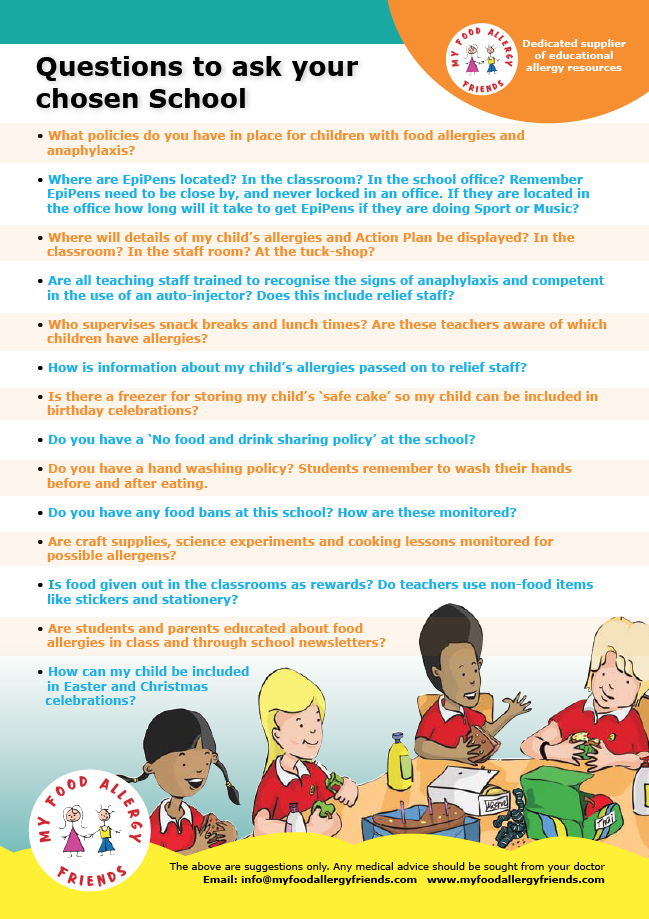Starting school is a big step for any child. Add food allergies to the mix, and it can make parents feel extremely anxious.
However, remember there are hundreds of children who attend school with allergies successfully with no incidents. Managing allergies at school can be done successfully, but it does take planning with your child as well as working alongside your school.
Unfortunately, the thought of school can send parents into a panic and understandably so. School is a very different environment from kindy with fewer teachers to children ratio, an open playground, and probably all your child’s allergens. This may be overwhelming for some children and parents who choose to have an allergen-free home or attend a childcare with a no nut policy or that have removed your child’s allergen/s.
The first thing to remember is that starting school is a massive step for any child, regardless of whether they have allergies or not. You want to celebrate your child starting school. It’s an exciting time for everyone. So however anxious you are feeling, try very hard not to show it as it will rub off on your child.
As well as working with your chosen school, you need to work with your child to prepare them for a new environment and new challenges that lie ahead. This means educating them about their allergies which hopefully you’ve been doing anyway.
Remind them of your family rules like no sharing food at school, and telling a teacher or adult if you are feeling unwell. Remind your child of these rules, and roleplay with your child so that if someone does offer them food, they know how to respond. Remind them even if the food looks safe or similar to something they have eaten before, they must always follow the rules and only eat food that mum and dad have provided. Many foods look similar and yet have different ingredients, or there may be a risk of cross-contamination.
Choosing your school requires a bit of research. I have many parents tell me they chose a small school as they feel it would be safer. This is not always the case. I know many large schools with excellent allergy management because they have great policies in place. It also comes down to attitude. Are they accommodating? Will they work with you to provide the safest environment for your child? In a nutshell, these are things to watch for :
- good attitude
- good allergy policies
- inclusion
- student education

Although some families choose schools some distance from their home because allergy policies are better, remember your child will have friends, where do these friends live? Playdates and sleepovers will eventually be part of your life, so make sure you take this into consideration.
Don’t assume a school is good because it already has many students with allergies. The school we chose had 26 students that required EpiPens. On paper, policies looked amazing, but after going through Prep, there was much work that still needed to be done to improve the school’s allergy management especially as regards inclusion of students with allergies. One example of this was all EpiPens were kept in the office. This is great if it’s a small school, however in certain areas of the school it would have taken too long to get the student their EpiPen. My request to have the EpiPen in the classroom was not met with understanding. There aren’t many schools that do an EpiPen drill. This means timing how long it would take to get a student their adrenaline in different locations of the school. Some schools even send another student to the office with a red card. It’s absolutely crazy to think another 5 year old should be given this responsibility.
A better system for larger schools is either to have EpiPens with the class teacher or EpiPens kept in a central location such as the office or first aid room but also school EpiPens can be placed throughout the school such as in the library or school hall. Ensuring that wherever you are, an EpiPen can be located quickly.
On my website, I have a page about starting school where you can find a list of questions to ask schools to help you find the right one for your child.
Preparing your child for school is crucial, but it’s also an ongoing thing. I have an educational book to assist parents in helping them prepare and discuss school with their children. It also comes with a checklist of how to prepare them before school and what to continue doing after school has started.
It’s vital to meet with your child’s class teacher before the first day of school to discuss allergy management. Also, advocate that your school is part of our allergy awareness program because students play a vital role in the management of allergies within schools and early learning centres.
To find out more about how to prepare for school or our food allergy smart program head to the website – https://myfoodallergyfriends.com/starting-school/
School Allergy Program – https://myfoodallergyfriends.com/schools/
If you are feeling overwhelmed and need help managing your anxiety about your child starting school, please get in contact with us and we will provide information on services to support you.
You may also like to read:









